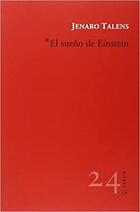Time usually passes without memory; but, as Alan Lightman points out in his monograph on the Theory of Relativity, there are two types of time, one rigid and mechanical that, like a pendulum, swings imperturbably back and forth and another corporeal, which twists and slips away like a fish in a bay. The first is inflexible and predetermined. The second is shaping the minds as it progresses. The poems in Einstein's Dream revolve around this second possibility, as scattered fragments of a mosaic that narrates the initiatory journey to and from the universe of childhood. By joining together they build a story where the different temporalities coexist, without elegy or nostalgia, in the only space of the here and now of the present.
All book titles by this author
|
Title |
Price | ||
|---|---|---|---|
|
|
El sueño de Einstein Author: Jenaro Talens Publisher: Salto de Página |
$256.00
20%$204.80 |
Shopping cart
Loading cart
Important notices
|
|
Recordando a André Rouillé: Su legado en la fotografía André Rouillé 1948 - 2025 |
|
|
Libros de filosofía y co. Disponibles en Librería Herder |
|
|
Revista Filosofía & Co. nº 9 Nueva revista de filosofia divulgativa y actualidad |
|
|
"Espacios de la filosofía" - Mauricio Beuchot - Novedad Herder México |
|
|
Revista Filosofía & Co. nº 8 Nueva revista de filosofia divulgativa y actualidad |
Pay safely with:


In the webshop
New
|
|
Medios calientes 70159 $400.00 -0.00% $400.00 |
|
|
Amigdalatrópolis 70157 $390.00 -0.00% $390.00 |
|
|
Detransición, baby 70158 $530.00 -0.00% $530.00 |
|
|
En busca del español correcto 70074 $400.00 -0.00% $400.00 |
|
|
Cantan los ángeles, rugen los monstruos 69202 $510.00 -0.00% $510.00 |
In the press
Promotions
|
|
Psicología de grupos 20787 $800.00 -80.00% $160.00 |
|
|
El Instante eterno 20573 $520.00 -50.00% $260.00 |
|
|
Hacerlo Explícito 20472 $3,585.00 -50.00% $1,792.50 |
|
|
Hartos de corrupción 34956 $400.00 -50.00% $200.00 |
|
|
Filosofía de la edad antigua 20411 $605.00 -50.00% $302.50 |





